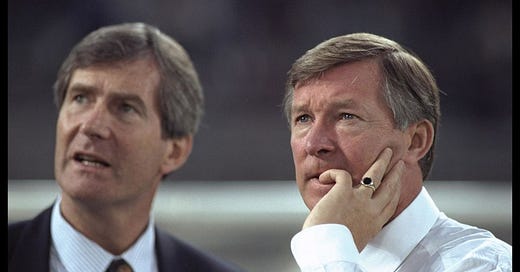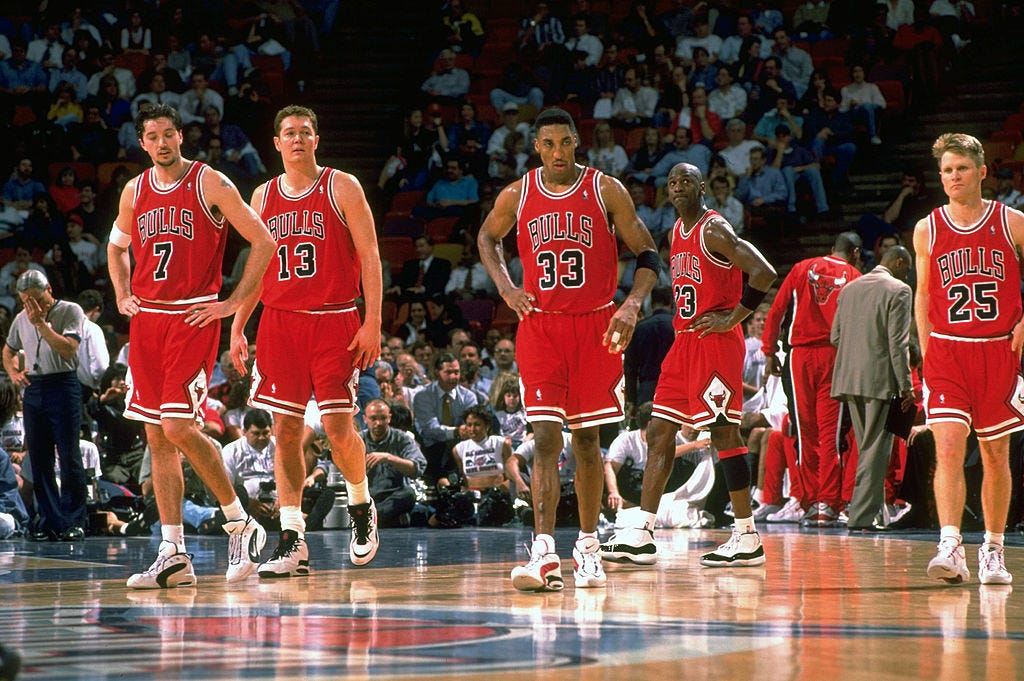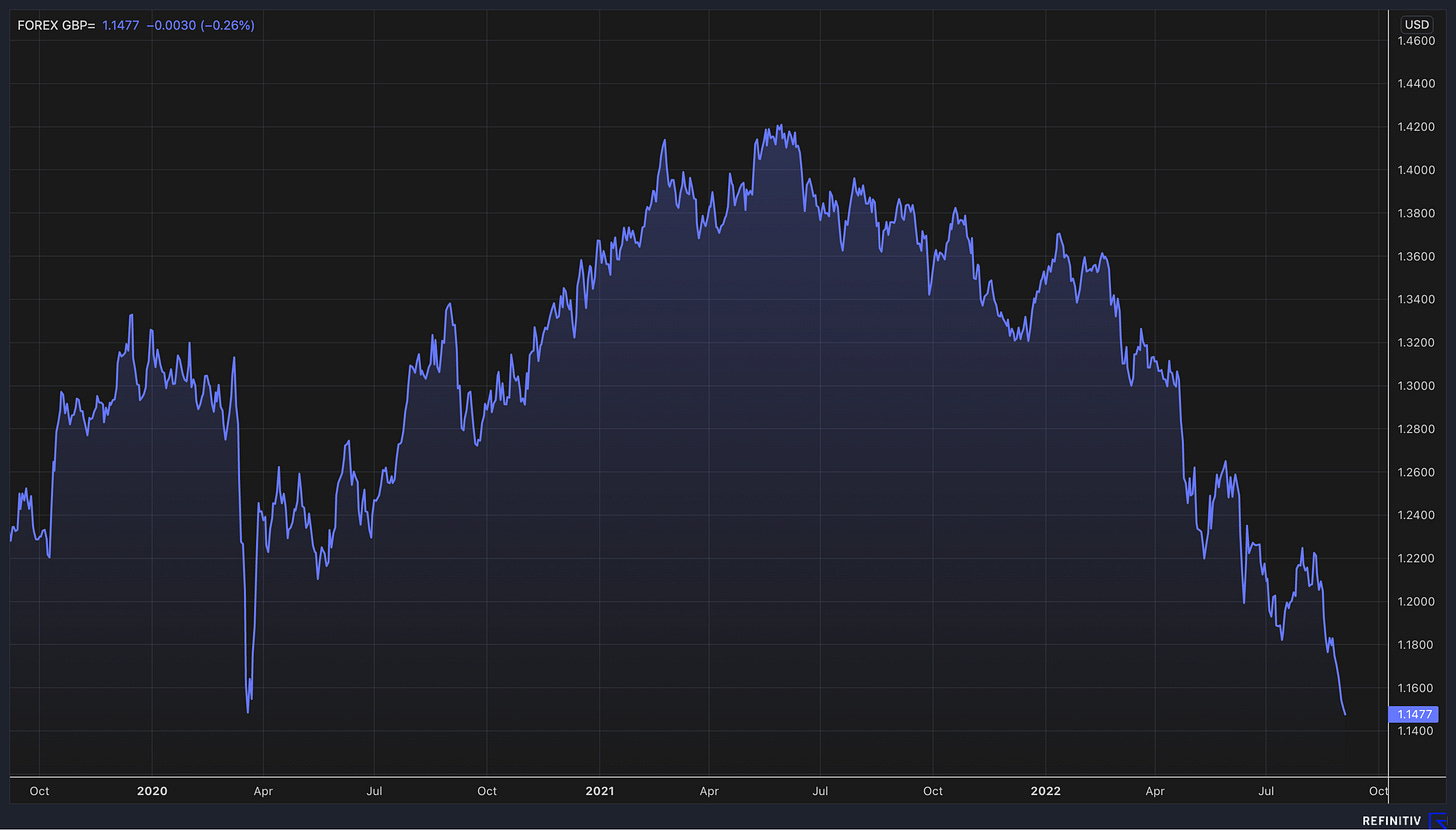Welcome to part one of Off to Lunch’s series on what business can learn from sport. If this newsletter was shared with you please sign-up below to become a member. You will get Off to Lunch sent directly to your inbox, be able to attend our events and contribute to the journalism behind this newsletter
Matt Dickinson’s new book 1999: Manchester United, the Treble and All That offers a remarkable insight into the Manchester United team of 1999 which won the Champions League, Premier League and FA Cup, an achievement that had not been done before in English football and has not been done since.
One of the things that stands out in the book is the lack of harmony behind the scenes - among the players, between the staff, and between the chairman and manager. This Manchester United team is remembered for its unprecedented achievements but also its spirit and never-say-die attitude. Yet behind-the-scenes a lot of them didn’t get on. Roy Keane and Peter Schmeichel, two of the senior players and leaders, openly disliked each other and had a fight in 1997 that left Schmeichel with a black eye. Keane and Teddy Sheringham didn’t speak, neither did Sheringham and Andy Cole. As Sheringham says in the book:
“It would be nice if everyone gets on but that was obvious from an early stage that that wasn’t going to happen.”
There was also tension between Martin Edwards, the chairman, and Alex Ferguson, the manager (who was knighted after Manchester United’s achievements in 1999). This tension was usually over money, with Edwards questioning players that Ferguson wanted to buy and not making as much money available for transfers as the manager wanted. Ferguson actually resigned in the summer of 1998 after Edwards and the board questioned his commitment and judgment. Ferguson withdrew his resignation later the same day. This is an interesting comment from Edwards in the book:
“I don’t think it necessarily works, a chairman and manager being too close. It’s short-term because as soon as somebody gets the sack, they fall out. We were never bosom pals, Alec and I, but I always respected his ability and his achievements. I supported him on buys if I thought they made sense. If it’s not right you’ve got to step and make your point and that’s all I ever did. So, the strength was there, and I don’t care what people say, whether it was a good or bad relationship - it doesn’t matter. What matters is are we winning, are we losing, are winning trophies? Are we satisfying the public? That’s what counts.”
Edwards was disliked and distrusted by Manchester United fans at the time, partly because of the money he had made from the flotation of the club. But looking back it is striking that Edwards had his own 14 per cent stake in Manchester United. He was not an independent chairman, he had skin in the game.
This lack of harmony in elite sport is common. Netflix’s brilliant documentary on the 1990’s Chicago Bulls basketball team, The Last Dance, recounts the tension between what was an eclectic group of players including Michael Jordan, Scottie Pippen, Dennis Rodman and Steve Kerr. Jordan punched Kerr in the face at one point. While Jordan is arguably the greatest basketball player of all time, Kerr has gone on to be one of the best coaches of all time with the Golden State Warriors.
Another striking example is the clashes between Ayrton Senna and Alain Prost at McLaren-Honda in 1988 and 1989. McLaren won 15 out of 16 races in that first season before tensions between the two boiled over with a crash at the 1989 Japanese Grand Prix. Prost left for Ferrari soon after
Yet in the business world we often hear about the importance of harmony or culture within firms. Look at boardrooms. A chairman and chief executive working harmoniously is celebrated. Other executives and non-executive directors are expected to get in behind strategic decisions. Non-executive directors in the FTSE work like a carousel where a small pool of people (still mostly white men over 50) go from one company to another.
These sporting achievements show that diversity of thinking, diversity of skill is more powerful than harmony. They also suggest, I think, that parts of the business world misunderstand culture and why it is important. Ferguson undoubtedly set standards and built a culture at Manchester United, Jordan set new ambitions for work-ethic and dedication at the Chicago Bulls. But these cultures were not about creating an environment where everyone agreed, it was about creating an environment where everyone could be the best they could possibly be.
The example of the relationship between Edwards and Ferguson also shows the benefits of a chairman being deeply connected to an organisation, rather than being independent, and being able to stand up to a chief executive, or in this case, a manager. Edwards may have been disliked by many, but Manchester United enjoyed unprecedented success on and off the pitch during his tenure.
Warren Buffett has spoken about the importance of strong chairman and boards many times in the past. He has also spoken about the problem of independent non-executive directors not being incentivised to speak-up or oppose proposals because they are being paid handsome salaries that they are reluctant to give up. This is what he wrote in Berkshire Hathaway’s annual letter to shareholders in 2020:
“Over the years, board “independence” has become a new area of emphasis. One key point relating to this topic, though, is almost invariably overlooked: Director compensation has now soared to a level that inevitably makes pay a subconscious factor affecting the behaviour of many non-wealthy members…
And job security now? It’s fabulous. Board members may get politely ignored, but they seldom get fired. Instead, generous age limits – usually 70 or higher – act as the standard method for the genteel ejection of directors.
Is it any wonder that a non-wealthy director (“NWD”) now hopes – or even yearns – to be asked to join a second board, thereby vaulting into the $500,000-600,000 class? To achieve this goal, the NWD will need help. The CEO of a company searching for board members will almost certainly check with the NWD’s current CEO as to whether NWD is a “good” director. “Good,” of course, is a code word. If the NWD has seriously challenged his/her present CEO’s compensation or acquisition dreams, his or her candidacy will silently die. When seeking directors, CEOs don’t look for pit bulls. It’s the cocker spaniel that gets taken home.
Despite the illogic of it all, the director for whom fees are important – indeed, craved – is almost universally classified as “independent” while many directors possessing fortunes very substantially linked to the welfare of the corporation are deemed lacking in independence. Not long ago, I looked at the proxy material of a large American company and found that eight directors had never purchased a share of the company’s stock using their own money. This particular company had long been a laggard, but the directors were doing wonderfully. Paid-with-my-own-money ownership, of course, does not create wisdom or ensure business smarts. Nevertheless, I feel better when directors of our portfolio companies have had the experience of purchasing shares with their savings, rather than simply having been the recipients of grants.
Shareholder advisory firms like Glass Lewis and ISS have pushed companies and investors hard on getting independent directors in the last few years. Yet the lessons from elite sport suggest that being tied to the organisation and seeking diversity-of-thought in a boardroom are crucial drivers of success. Boards who are not thinking about these lessons and blindly following the demands of shareholder advisory groups risk damaging their decision-making process.
Housekeeping and next week…
Off to Lunch will be operating in a reduced form next week because I am in Italy for a wedding and short holiday. There will be shorter editions on Monday and Friday for paying members but no editions on Wednesday and Sunday. This will be my last break until December. If you are paying member and would like to pause your subscription next week, please do so, I do understand, the option is available on your account page…
A chart that helps you understand the world…
An update to Friday’s Off to Lunch on the problems facing the pound - sterling has carried on falling against the dollar since then and is now perilously close to dipping below the lows it hit in March 2020, which would be the lowest it has been since 1985. For more on this topic, check out David Smith’s column in the Sunday Times yesterday (link here)…
Other stories that matter…
The building which inspired the structure used by skyscrapers today is the Shrewsbury Flaxmill Maltings in Shropshire. It was the first building to use an internal frame of iron columns. After a multi-million pound renovation it is due to reopen on Saturday with a museum, cafe, and co-working space (The Times)
The UK’s new accountancy and corporate governance regulator, the Audit, Reporting and Governance Authority (Arga), is going to be based in Birmingham, not London (FT)
There is some really interesting stuff going on in Europe regarding public transport at the moment and I hope the new prime minister is looking to learn from it. Germany has just finished a three-month trial where it offered unlimited travel on regional trains, metros and buses for just €9 a month while Spain has just launched free tickets on local and middle-distance train journeys until the end of the year. These schemes have two key benefits - they help households to cope with the rising cost-of-living and encourage people to go into the office. Could a similar scheme work in the UK? The Sunday Telegraph had a look at this question over the weekend. The answer seems to be “yes it would”, but the capacity of the transport network is already bursting in some places and the government would have to take on a larger share of the costs of the travel (Sunday Telegraph)
I have mentioned Tom Rowley’s newsletter and Backstory bookshop before, but the latest edition is worth your time. The newsletter is tracking Tom’s efforts to open a new independent bookshop in Balham, south London. This week’s edition outlines how he managed to raise more than £20,000 in five days through crowdfunding to pay for the fit-out of the shop and how much he has to do before it opens in three weeks (My bookshop adventure by Tom Rowley)
I am late to the whole “you need to breath better to get healthier” craze but this is a useful starting point for those looking to catch-up on the debate like me. This feature involves Coldplay’s Chris Martin and England cricketer Ollie Robinson (The Times)
Day-dreaming and mind-wandering are good for you, apparently. They could be happening because your brain is trying to do some work when it thinks that not much is going on (Knowable)
Off to Lunch’s Sunday press review was sent to paying subscribers yesterday. If you missed it and want a full round-up of what was interesting in the newspapers then you can read it and sign-up here.
And finally…
Some light entertainment to finish today, because it feels like that sort of day. This is what happens when you try to be clever with a penalty in football and it goes very, very wrong…

Thanks for reading. Off to Lunch will be back on Wednesday. If you enjoy Off to Lunch then please share it with others and spread the word. If this newsletter was shared with you then please sign-up below to become a member and get Off to Lunch sent directly to your inbox
Best
Graham







